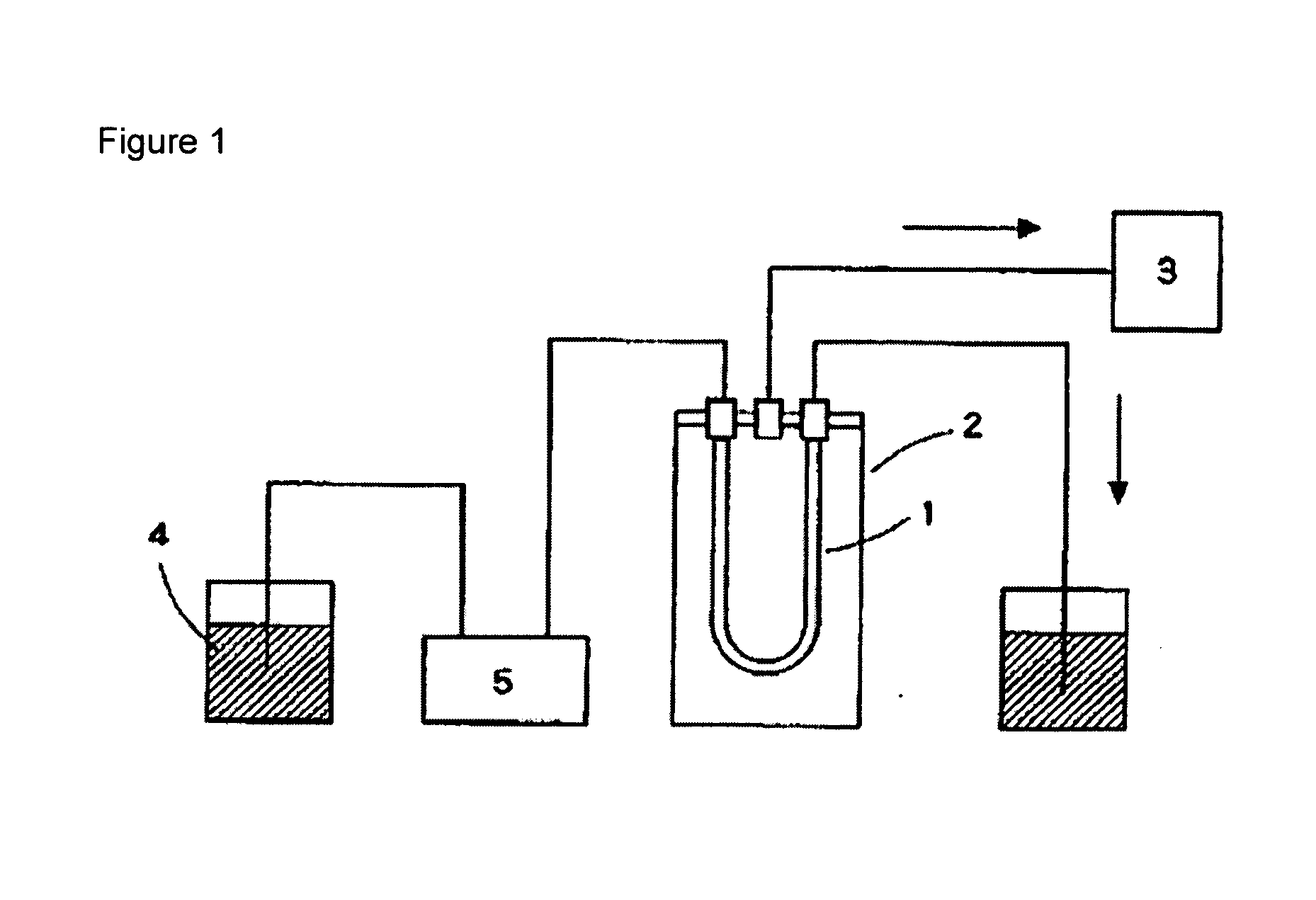Tubular member made of fluororesin
a tubular member and fluororesin technology, applied in the field of fluororesin tubular members, can solve the problems of reducing gas permeability, unable to use countermeasures such as establishing a multi-layered, and affecting the gas flow rate, so as to reduce gas leakage and condensation on the tube surfa
- Summary
- Abstract
- Description
- Claims
- Application Information
AI Technical Summary
Benefits of technology
Problems solved by technology
Method used
Image
Examples
##ventive example 1
INVENTIVE EXAMPLE 1
[0029] A tube having an inside diameter of 13.4 mm and an outside diameter of 17.9 mm was fabricated as a result of passing tetrafluoroethylene-fluoroalkyl vinyl ether copolymer (PFA451HP-J; manufactured by Du Pont-Mitsui Fluorochemicals Co., Ltd.) from a single-screw extruder having a die temperature of 380° C. through a former.
[0030] The tube was subsequently stretched 600% at a temperature of 280° C., a travelling speed of 0.17 m / min, and a pulling speed of 1.0 m / min, whereupon an annealing treatment was performed at a temperature of 220° C., a travelling speed of 0.60 m / min, and a pulling speed of 0.50 mm / min, and a 20% shrinkage treatment was performed.
TEST METHOD
[0031] As shown in FIG. 1, the flow rate of a metering pump 5 was varied to feed oxygen-saturated purified water 4 at a temperature of 25° C. to a 1080 mm sample tube 1, which was attached to a decompression vessel 2. The oxygen concentration was 8.1 ppm. In this configuration, the decompression v...
##ventive example 2
INVENTIVE EXAMPLE 2
[0034] A tube having an inside diameter of 12.2 mm and an outside diameter of 16.3 mm was fabricated as a result of passing tetrafluoroethylene-hexafluoropropylene copolymer (FEP NP-20; manufactured by Daikin Industries Ltd.) from a single-screw extruder having a die temperature of 380° C. through a former.
[0035] The tube was subsequently stretched 500% at a temperature of 230° C., a travelling speed of 0.20 m / min, and a pulling speed of 1.0 m / min, whereupon an annealing treatment was performed at a temperature of 180° C., a travelling speed of 0.60 m / min, and a pulling speed of 0.50 mm / min, and a 20% shrinkage treatment was performed.
[0036] The gas permeability of Inventive Example 2 (length: 1090 mm) was measured in the same manner as in Inventive Example 1. The results for Inventive Example 2 are displayed in Table 2.
##ventive example 3
INVENTIVE EXAMPLE 3
[0039] A tube having an inside diameter of 13.4 mm and an outside diameter of 17.9 mm was fabricated as a result of passing tetrafluoroethylene-fluoroalkyl vinyl ether copolymer (950HP-plus; manufactured by Du Pont-Mitsui Fluorochemicals Co., Ltd.) from a single-screw extruder having a die temperature of 380° C. through a former.
[0040] The tube was subsequently stretched 600% at a temperature of 280° C., a travelling speed of 0.15 m / min, and a pulling speed of 0.9 m / min, whereupon an annealing treatment was performed at a temperature of 200° C., a travelling speed of 0.60 m / min, and a pulling speed of 0.50 mm / min, and a 20% shrinkage treatment was performed.
[0041] The gas permeability of Inventive Example 3 (length: 1100 mm) was measured in the same manner as in Inventive Example 1. The results for Inventive Example 3 are displayed in Table 3.
PUM
| Property | Measurement | Unit |
|---|---|---|
| diameter | aaaaa | aaaaa |
| diameter | aaaaa | aaaaa |
| die temperature | aaaaa | aaaaa |
Abstract
Description
Claims
Application Information
 Login to View More
Login to View More - R&D
- Intellectual Property
- Life Sciences
- Materials
- Tech Scout
- Unparalleled Data Quality
- Higher Quality Content
- 60% Fewer Hallucinations
Browse by: Latest US Patents, China's latest patents, Technical Efficacy Thesaurus, Application Domain, Technology Topic, Popular Technical Reports.
© 2025 PatSnap. All rights reserved.Legal|Privacy policy|Modern Slavery Act Transparency Statement|Sitemap|About US| Contact US: help@patsnap.com

